Kraków Saki Cards Taikai 2022
We invite you to the first ever Polish tournament with Saki Cards! It will take place at 14th August 2022 in the Boardowa cafe.

About
- Date: 14th August 2022 (Sunday)
- Place: Boardowa Cafe, Topolowa 52, 31-506 Kraków
- Rules: modified EMA 2016; uma +15/+5/-5/-15; no oka
- Hanchans: 4
- Judges: Michał Herda (will not play), Szymon Nowicz
- Substitute players: TBA
- Fee: TBA (expected to be between 35 and 50PLN)
- Participant limit: 24
- Scoring: Point sticks
- Starting score: 30000
Rules
The ruleset is EMA 2016 with the following modifications::
Kazoe Yakuman
Hand with 13 or more han is counted as a Yakuman.
Additional yaku: Nagashi Mangan (流し満貫)
Earned if during ryuukyoku plyer meets all of these conditions
- Every visible discard of a player must be a terminal or an honor tile.
- No tiles may have been called from the player’s own discard pile.
A player has to have a closed hand.
- Always worth 5 han (mangan), doesn’t stack with other yaku or dora.
Saki Cards
Before the beginning of a hanchan the first dealer deals every player 6 cards from the deck, those will be their cards for this hanchan. If a player wins a round using a card they discard it and draw a new one from the deck.
Players choose their card after they see their staring hand every round, after a player has chosen a card they put it on their right side and reveal it when all players are ready.
There are 53 cards in the deck, each one with a different ability.
Card list
Aislinn Wishart
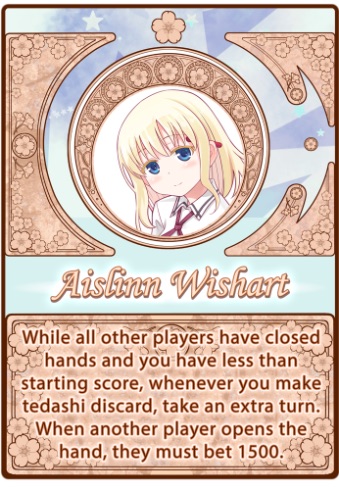
While all other players have closed hands and you have less than the starting score, whenever you make a tedashi discard, take an extra turn.
- First discard of the oya is always tedashi.
- You don’t get an extra turn when you call.
Tedashi discard is the opposite of tsumogiri discard, that is, discarding any other tile than the one you just drew.
- When another player opens the hand, they must bet 1500.
Usuzawa Sae
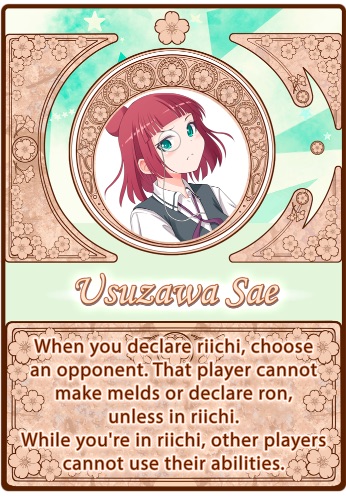
- When you declare riichi, choose an opponent. That player cannot make melds or declare ron, unless in riichi.
- While you’re in riichi, other players cannot use their abilities.
Amae Koromo

Both haitei and houtei tiles are always your winning tiles.
If Kanbara Satomi is also in play, both the last tiles of live wall and dead wall work.
When you discard a tile from a closed hand, move 1 tile from the end of the live wall to the dead wall. When you are the only player in riichi, move 2 tiles instead.
Anetai Toyone

Chasing riichi, that is riichi declared after another player already declared riichi gives you 2 han.
Chasing riichi 2 han replaces 1 han of riichi
- Yaku Shiiaru Raotai(十二落抬) is available for you, worth 2 han and gives acces to ura dora. Earned if you have a single pair wait with four open melds. Example:

Winning with riichi or shiiaru raotai on a tile discarded by player in riichi gives you 1 han for every 1000 on board.
- Riichi doesn’t have to be chasing.
Arakawa Kei
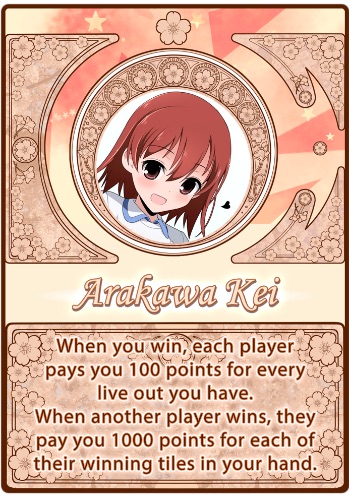
- When you win, each player pays you 100 points for every live out you have..
- Live out are tiles that player can win on that are not already visible in discards, melds, indicators or your hand.
- When another player wins, they pay you 1000 points for each of their winning tiles in your hand.
- When you win, each player pays you 100 points for every live out you have..
Atago Hiroe
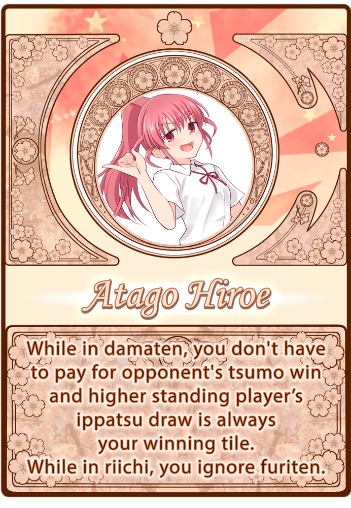
- If you are in damated, that is tenpai with a closed hand without riichi:
- you don’t have to pay for opponent’s tsumo win
- Higher standing player’s ippatsu draw is always your winning tile.
- Ippatsu draw is a draw that can grant player victory with Ippatsu Tsumo. When ippatsu is broken by a call, the next draw of a player in riichi is considered a normal draw instead.
- While in riichi, you may ignore furiten.
- If you are in damated, that is tenpai with a closed hand without riichi:
Atarashi Ako
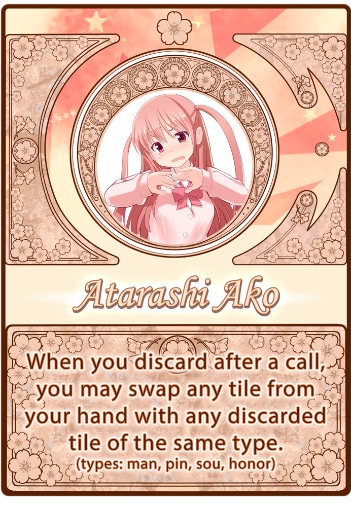
- When you discard after a call You may swap any tile from your hand with any discarded tile of the same type.
- types: manzu, pinzu, souzi, honors
- When you discard after a call You may swap any tile from your hand with any discarded tile of the same type.
Choe Myeonghwa
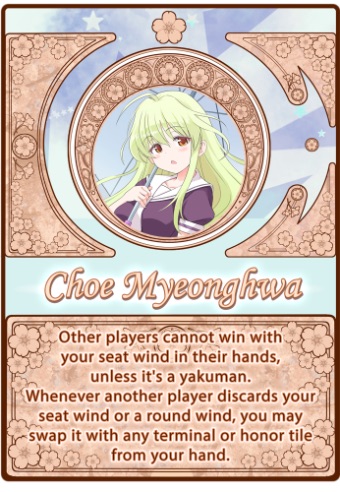
- Other players cannot win with your seat wind tiles in their hands, unless it’s a yakuman.
- Whenever another player discards your seat wind or a round wind, you may swap it with any terminal or honor tile from your hand.
Ezaki Hitomi
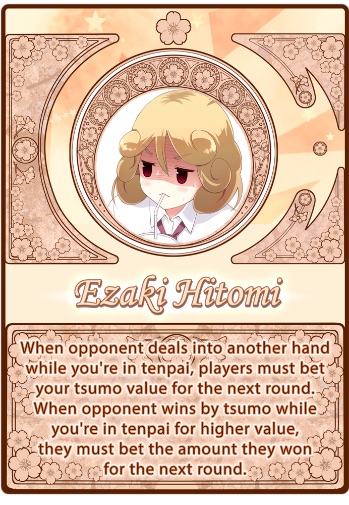
- When opponent deals into another hand while you’re in tenpai, players must bet your tsumo value for the next round.
- When opponent wins by tsumo while you’re in tenpai for higher value, they must bet the amount they won for the next round.
Fukuji Mihoko
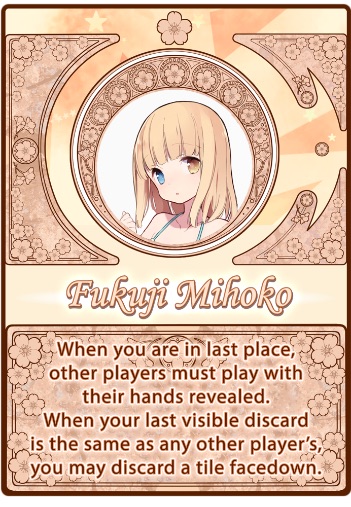
- When you are in last place, other players must play with their hands revealed.
- When your lmaast visible discard is the same as any other player’s, you may discard a tile facedown.
Hanada Kirame
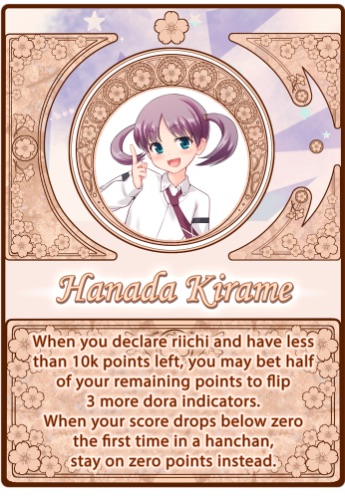
- When you declare riichi and have less than 10000 points left, you may bet half of your remaining points to flip 3 more dora indicators.
- When your score drops below zero for the first time in a hanchan, stay on zero points instead.
Hao Huiyu
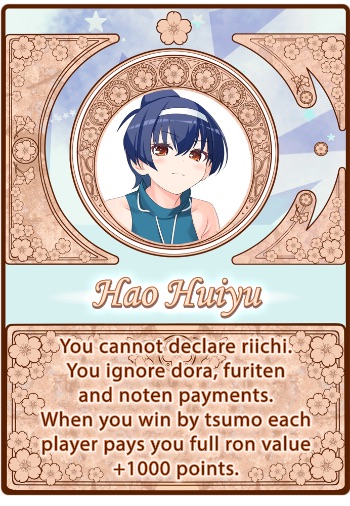
- You cannot declare riichi.
- You ignore dora, furiten and noten payments.
- When you win by tsumo each player pays you full ron value +1000 points.
Haramura Nodoka
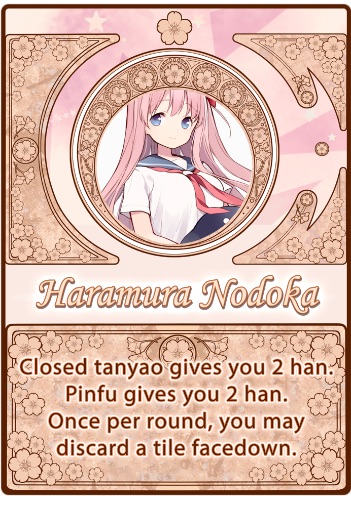
- Closed tanyao gives you 2 han.
- Pinfu gives you 2 han.
- Once per round, you may discard a tile facedown.
Hirose Sumire
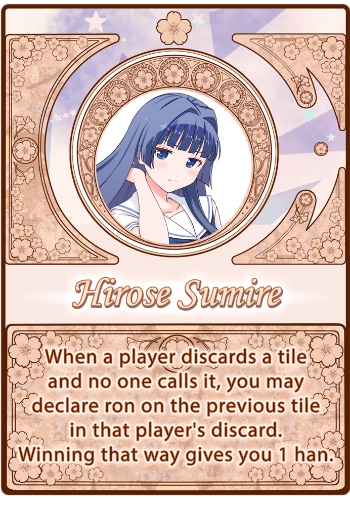
- When a player discards a tile and no one calls it, you may declare ron on the previous tile in that player’s discard. Winning this way gives you 1 han.
Ikeda Kana
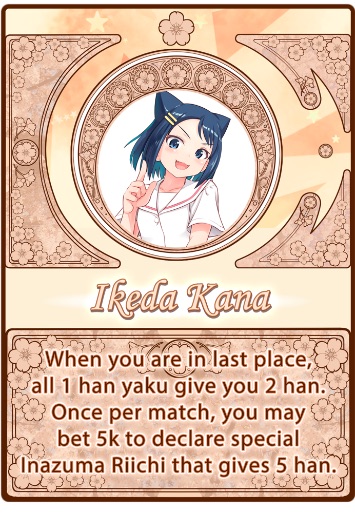
- When you are in last place, all 1 han yaku give you 2 han.
- Dora isn’t a yaku.
- Once per hanchan, you may bet 5k to declare special Inazuma Riichi that gives 5 han.
- If you get ronned on the tile you used to declare Inazuma riichi, the riichi wasn’t finalized, so you declare it once more.
- When you are in last place, all 1 han yaku give you 2 han.
Inoue Jun
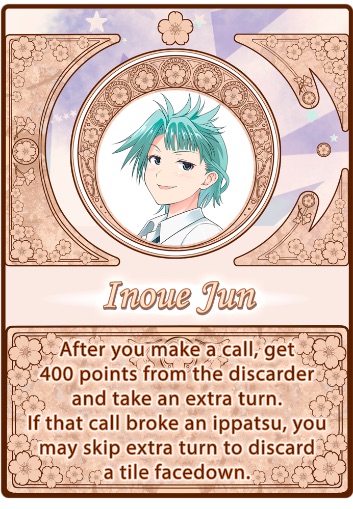
- After you make a call, get 400 points from the discarder and take an extra turn.
- If that call broke an ippatsu, you may skip extra turn to discard a tile facedown.
- After you make a call, get 400 points from the discarder and take an extra turn.
Iwato Kasumi
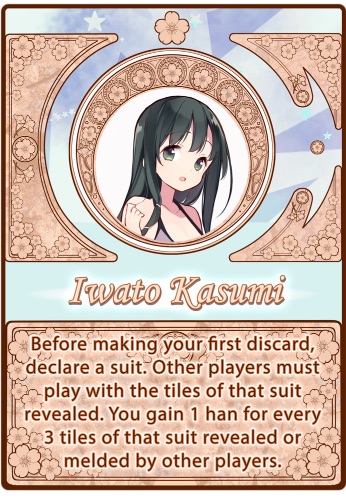
- Before making your first discard, declare a suit(manzu, pinzu, souzu, honors) . Other players must play with the tiles of that suit revealed. You gain 1 han for every 3 tiles of that suit revealed or melded by other players.
- Tiles of that suit drawn later by other players also should be revealed.
- Before making your first discard, declare a suit(manzu, pinzu, souzu, honors) . Other players must play with the tiles of that suit revealed. You gain 1 han for every 3 tiles of that suit revealed or melded by other players.
Jindai Komaki
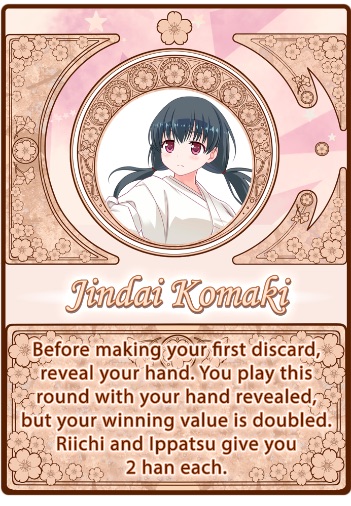
- Before making your first discard, reveal your hand. You play this round with your hand revealed.
- Your winning value is doubled.
Riichi and Ippatsu give you 2 han each.
- Double Riichi gives you 4 han.
Kainou Yoshiko
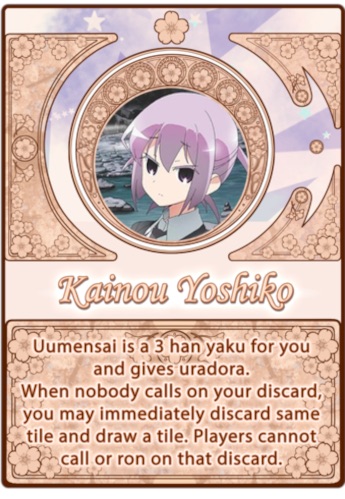
- Yaku Uumensai(五門斉) is available for you, gives 3 han and uradora. Earned if you have a hand with all 3 suits, a dragon and a wind. Open hand is allowed. Chiitoitsu is allowed. Examples:


- When nobody calls on your discard, you may immediately discard the same tile and draw a tile. Other players cannot call or ron on that tile.
- Yaku Uumensai(五門斉) is available for you, gives 3 han and uradora. Earned if you have a hand with all 3 suits, a dragon and a wind. Open hand is allowed. Chiitoitsu is allowed. Examples:
Kajiki Yumi
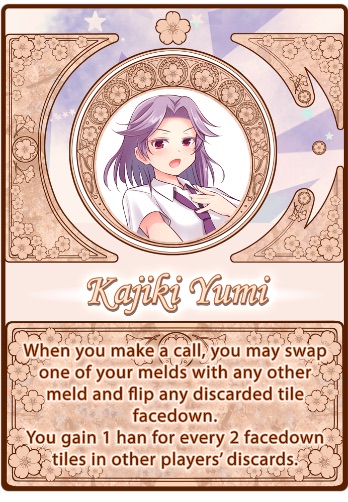
- When you make a call, you may swap one of your melds with any other meld and flip any discarded tile facedown.
- You can swap closed kans, with that you can close or open somebody’s hand
- You can’t swap a closed kan from a player in riichi.
- You can swap nonstadard melds of other cards, it may result in an illegal hand.
- You can swap a meld you just made.
- You gain 1 han for every 2 tiles discarded facedown by other players.
- When you make a call, you may swap one of your melds with any other meld and flip any discarded tile facedown.
Kakura Kurumi
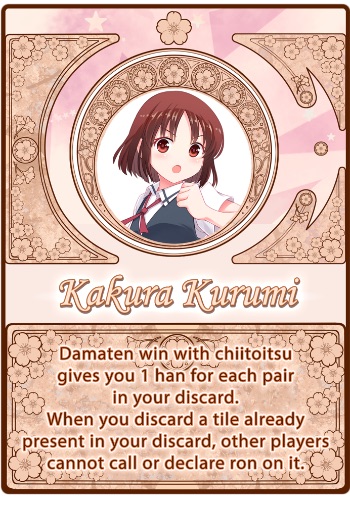
- Damaten(Tenpai with a closed hand without riichi) win with chiitoitsu gives you 1 han for each pair in your discard.
- When you discard a tile already present in your discard, other players cannot call or declare ron on it.
- That tile still gives furiten to other players.
Kanbara Satomi
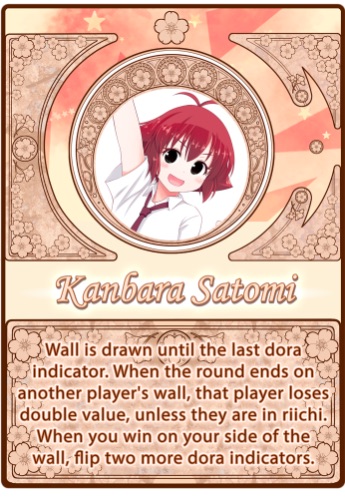
- Wall is drawn until the last visible dora indicator.
- There are two opputunites to get haitei and houtei yaku, the last tile in the live wall and the last tile in the dead wall.
- When the round ends on another player’s wall, that player loses double value, unless they are in riichi. When you win on your side of the wall, flip two more dora indicators.
- Losing double also applies to noten penalty.
- The wall changes when the first tile from the new wall gets drawn.
- When a player wins with a tile from the dead wall, it’s the live wall that matters.
- If you were to reveal the 6th or the 7th dora indicator, use the live wall for that.
- Wall is drawn until the last visible dora indicator.
Karijuku Tomoe
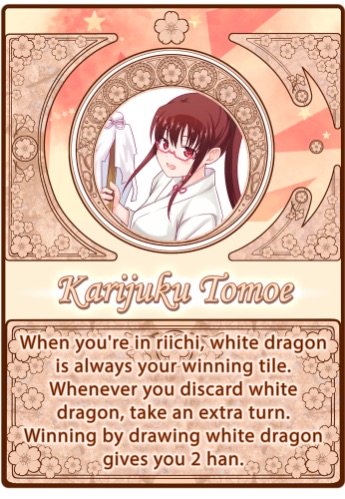
- When you’re in riichi, white dragon is always your winning tile.
- Discarding a white dragon doesn’t mean you can’t win on a white dragon discarded in your riichi, it gives you furiten only if you are waiting for the real white dragon.
- Whenever you discard white dragon, take an extra turn.
- Winning by drawing white dragon gives you 2 han.
- When you’re in riichi, white dragon is always your winning tile.
Kataoka Yuuki
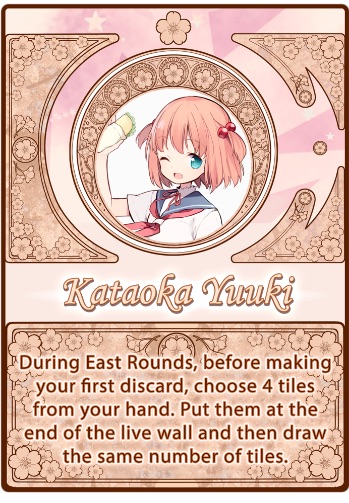
- During East Rounds, before making your first discard, choose 4 tiles from your hand. Put them at the end of the live wall and then draw the same number of tiles.
Kosegawa Shiromi
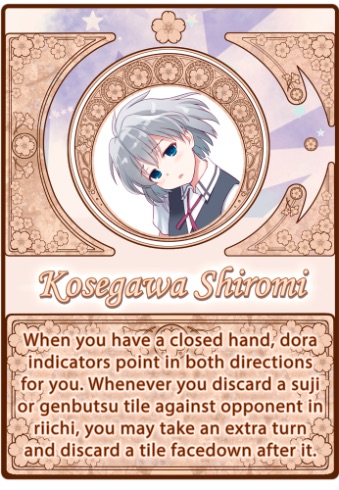
- When you have a closed hand, dora indicators point in both directions for you.
- Whenever you discard a suji or genbutsu tile against opponent in riichi, you may take an extra turn and discard a tile facedown after it.
- Genbutsu tile is every tile discarded by a player in riichi and every tile discarded after a player’s riichi.
- Suji is a tile 3 smaller or larger than a tile discarded by a player in riichi, for 4,5 and 6 suji has to be from both sides. For example when you discard 4, then 1 and 7 are suji, when you discard 3 and 9, then 6 is suji.
- There may be a situation where a discarded tile would give genbutsu or suji, but it can’t be ronned because of an another ability. for you that tile still activates the ability, but it may not be safe.
- Tiles discarded by hiroe in riichi still give genbutsu and suji, even if she ignores furiten.
Kunihiro Hajime
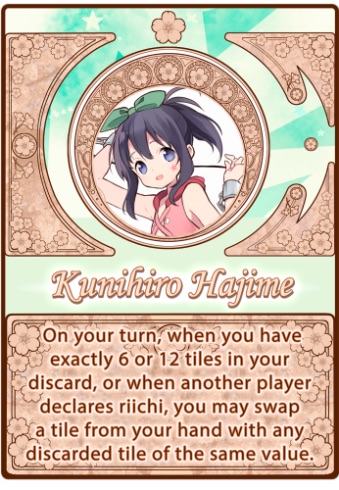
- On your turn, when you have exactly 6 or 12 tiles in your discard or when another player declares riichi, you may swap a tile from your hand with any discarded tile of the same value.
- You have two oppurtunities to swap a tile with 6/12 in your discards. Right after you discard your 6th/12th tile or when it’s your turn and you have to discard the 7th/13th tile.
- Value is the number which you would assing to it, e.g. 6 man i 6 souzu. Honors don’t have a value.
- On your turn, when you have exactly 6 or 12 tiles in your discard or when another player declares riichi, you may swap a tile from your hand with any discarded tile of the same value.
Mase Yuuko

You may arrange tiles into wrapping sequences (e.g. 912). Example:
 This hand waits for 825 souzu
This hand waits for 825 souzu3 sequences 912 345 678, or 891 234 567 don’t give you ittsuu.
- You cannot call pon or kan.
- Every three identical tiles in your discard give you 1 han.
Matano Seiko
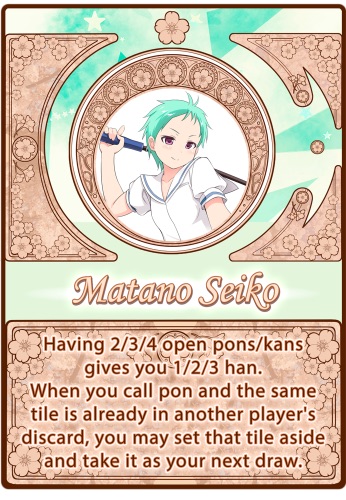
- Having 2/3/4 open pons gives you 1/2/3 han.
- When you declare pon and the same tile is already in another player’s discard you may set that tile aside and take it as your next draw.
Matsumi Kuro
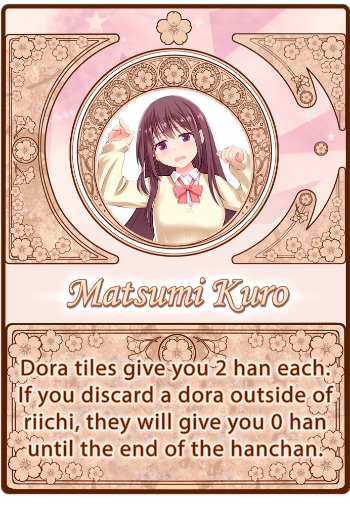
- Dora tiles give you 2 han each.
- ultiplied dora is redoubled.
- If you discard a dora outside of riichi, they will give you 0 han until the end of the hanchan.
- Dora discard is only counted when the tile is among known dora tiles at the moment of the discard. The effect lasts until the end of the hanchan, but is only limited for Kuro herself.
- Dora tiles give you 2 han each.
Matsumi Yuu
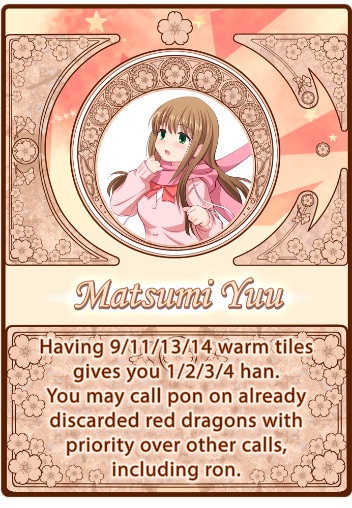
- Having 9/11/13/14 red tiles gives you 1/2/3/4 han.
- Warm tiles are tiles with red paint on them, that is:

- Warm tiles are tiles with red paint on them, that is:
- You may call pon on already discarded red dragons with priority over other calls, including ron.
- You may declare pon on a red dragon in the player’s discard whenever that player’s discards a tile. So the timing is the same as with normal pon, but instead of taking the latest discard, you take red dragon.
- Having 9/11/13/14 red tiles gives you 1/2/3/4 han.
Maya Yukiko

- You may call chii from any player with priority over other calls, including ron.
- When you win by tsumo, double your winning value from players you called chii from.
Megan Davin

- Before making your first discard, choose one opponent to initiate a duel with.
- Duelists pay double value to each other and your rival cannot use their ability.
- Noten payment between players is also doubled. If 2 players have noten, 1500 points is paid to the closed player which did not yet get points from another player. That is if for example East and north are noten, East pays South, and North pays Zachodowi, or if South and North are in Noten, South pays West, and North pays East.
- When a player other than the players in duel declares riichi, the duel ends.
Miyanaga Saki
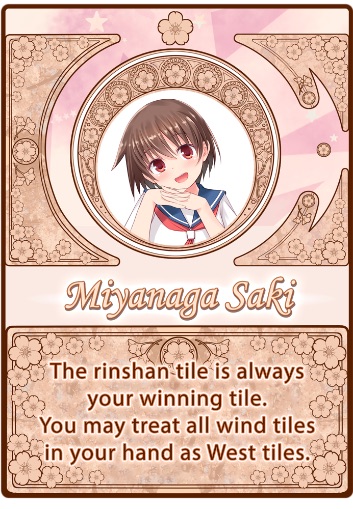
- The rinshan tile is always your winning tile.
- “Rinshan Tile” is the tile you draw when you declare a kan, on which when you win you get the yaku “Rinshan Kaihou”
- Other player’s Rinshan tiles are also always your winning tile.
- You may treat all wind tiles in your hand as West tiles.
- You may treat all wind tiles in your hand as West tiles.
- When multiple players declare pon on the same tile, player that closer to the discarder in turn order will have priority.
- Multiple instances of the same yaku are counted. So if you have two pons of West wind, each one will grant you a yakuhai.
- Saki cannot win a hand (unless it’s yakuman), if she has one of Choe’s physical seat wind in her melds, even if she treats it as west wind.
- Other wind tiles can only be treated as west tile for Saki. If another player can win on at least one tile in Saki’s concealed kan, the player may perform chankan on it if they are in tenpai for kokushi musou.
- The rinshan tile is always your winning tile.
Miyanaga Teru
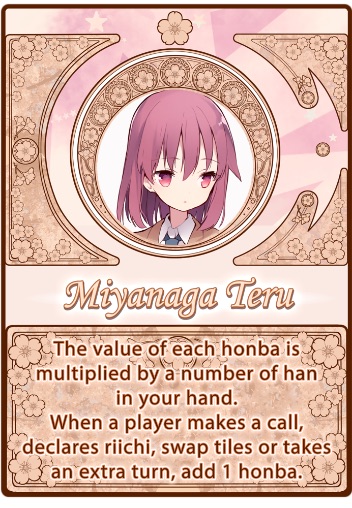
- The value of each honba is multiplied by a number of han in your hand.
- For example if there are 2 honbas and you have 5 han. Each honba is worth 100*5=500 points, so you will get an additional 1000 points.
- When a player makes a call, declares riichi, swap tiles or takes an extra turn, add 1 honba.
- Swapping a tile from a hand with the additional tile by Onjouji Toki also triggers this ability.
- The value of each honba is multiplied by a number of han in your hand.
Nanpo Kazue
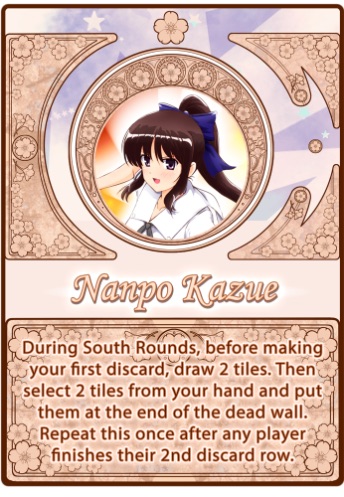
- During South Rounds, before making your first discard, draw 2 tiles. Then select 2 tiles from your hand and put them at the end of the dead wall. Repeat this once after any player finishes their 2nd discard row.
Nelly Virsaladze

- If you deal-in or round ends in a draw, you take all the points left(besides honba sticks) on the board and other players pay you 1000 each.
- If you dealt-in last round, declaring riichi before 7th/9th turn gives you 2/1 extra han.
Onjouji Toki
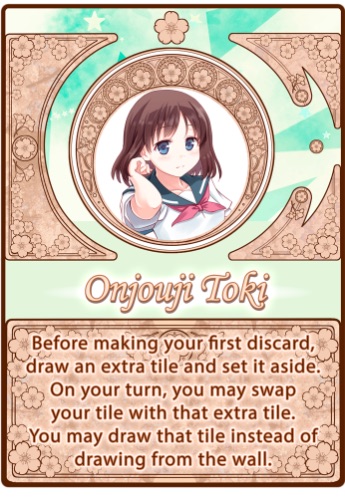
- Before making your first discard, draw an extra tile and set it aside visible only for you.
- On your turn, you may swap a tile from the closed part of your hand with that extra tile.
- You may draw that tile instead of drawing from the wall.
- You can take your extra tile instead of your rinshan draw. If you win on that tile, this would also count as rinshan kaihou yaku.
- Before making your first discard, draw an extra tile and set it aside visible only for you.
Oohoshi Awai
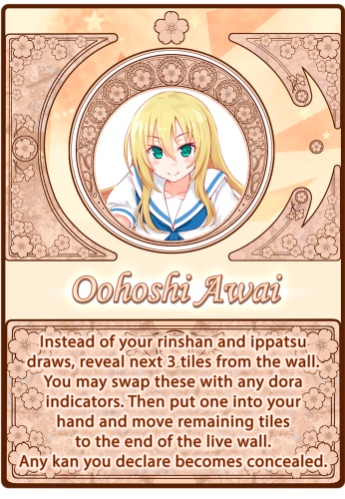
- Instead of your rinshan and ippatsu draws, reveal next 3 tiles from the wall. You may swap these with any dora indicators. Then put one into your hand and move remaining tiles to the end the live wall.
- Ippatsu draw is a draw that can grant player victory with Ippatsu Tsumo. When ippatsu is broken by a call, the next draw of a player in riichi is considered a normal draw instead.
- Rinshan draw is a draw that you get after making a kan that can grant player victory with Rinshan Kaihou.
- Any kan you declare becomes concealed.
- You can declare open kan even when she is in riichi if it doesn’t change her wait.
- In case of a shouminkan(added kan) you can still win with chankan on it before it becomes closed. If a player doesn’t win on it, but they could, they don’t get furiten.
- In case of a daminkana(open kana) the tile that was used for is exempt from furiten and doesn’t break nagashi.
- Instead of your rinshan and ippatsu draws, reveal next 3 tiles from the wall. You may swap these with any dora indicators. Then put one into your hand and move remaining tiles to the end the live wall.
Ryuumonbuchi Touka
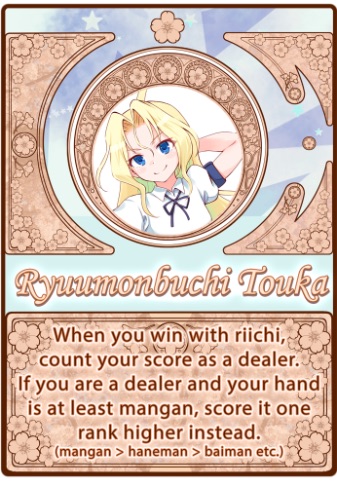
- When you win with riichi, count your score as a dealer.
- If you are a dealer and your hand is at least mangan, score it one rank higher instead.
- Rangs are: mangan > haneman > baiman > sanbaiman > kazoe yakuman
Sagimori Arata
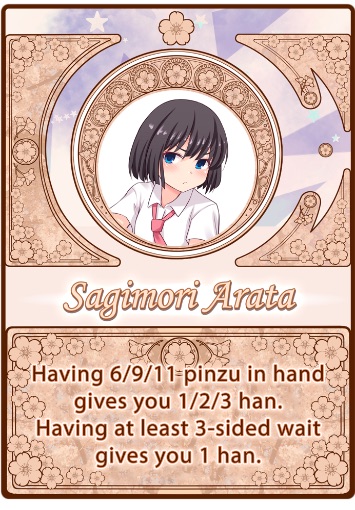
- Having 6/9/11 pinzu in hand gives you 1/2/3 han.
- Having at least a 3-sided wait gives you 1 han.
Sawamura Tomoki
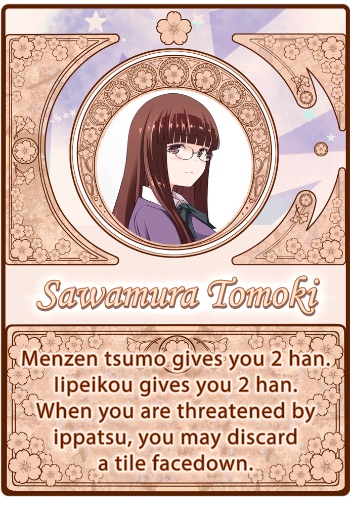
- Menzen tsumo gives you 2 han.
- Iipeikou gives you 2 han.
- When you are threatened by ippatsu, you may discard a tile facedown.
Senoo Kaori
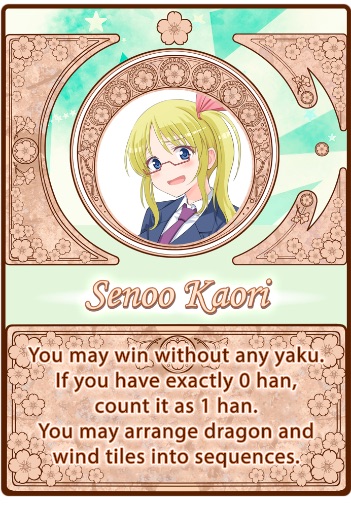
- You may win without any yaku.
- If you have exactly 0 han, count it as 1 han.
- You may arrange dragon and wind tiles into sequences.
- Sequences from honors don’t give you additional fu.
- Winds don’t wrap in sequences, e.g. you can’t have a sequence with north, east and south. Example:
 That hand is pinfu.
That hand is pinfu.
- You may win without any yaku.
Shibuya Takami
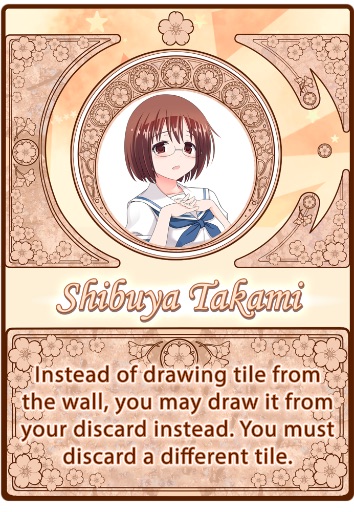
- Instead of drawing tile from the wall, you may draw it from your discard instead. You must discard a different tile.
Shimizudani Ryuuka
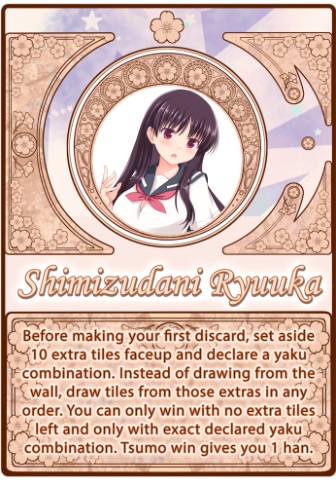
- Before making your first discard, set aside 10 extra tiles faceup and declare a yaku combination. Instead of drawing from the wall, draw tiles from those extras in any order. You can only win with no extra tiles left and only with exact declared yaku combination.
- You can have more yaku in your hand, but they won’t be taken into account when scoring.
- To win, you need to have an exact combination of declared yaku. If you declare Menzen Tsumo yaku as a part of your combination and then win by ron, then it’s an illegal win.
- Tsumo win gives you 1 han.
- That bonus for tsumo win is awarded regardless of whether Menzen Tsumo yaku was declared or not.
- Before making your first discard, set aside 10 extra tiles faceup and declare a yaku combination. Instead of drawing from the wall, draw tiles from those extras in any order. You can only win with no extra tiles left and only with exact declared yaku combination.
Shirouzu Mairu
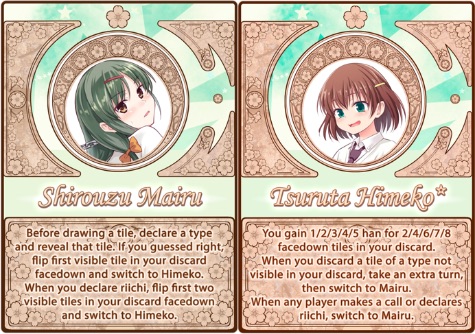
- Shirouzu Mairu
- Before drawing a tile, declare a type(manzu, pinzu, souzu or honors) and reveal that tile. If you guessed right, flip first visible tile in your discard facedown and switch to Himeko.
- Also guess before your first draw, even if you don’t have a tile to flip in your discards.
- When you declare riichi, flip first two visible tiles in your discard facedown and switch to Himeko.
- Before drawing a tile, declare a type(manzu, pinzu, souzu or honors) and reveal that tile. If you guessed right, flip first visible tile in your discard facedown and switch to Himeko.
- Tsuruta Himeko
- This card should never be shuffled into the deck!
- You gain 1/2/3/4/5 han for 2/4/6/7/8 facedown tiles in your discard.
- When you discard a tile of a type not visible in your discard, take an extra turn, then switch to Mairu.
- If you don’t take the extra turn, you still switch to mairu.
- When any player makes a call or declares riichi, switch to Mairu.
- Shirouzu Mairu
Someya Mako
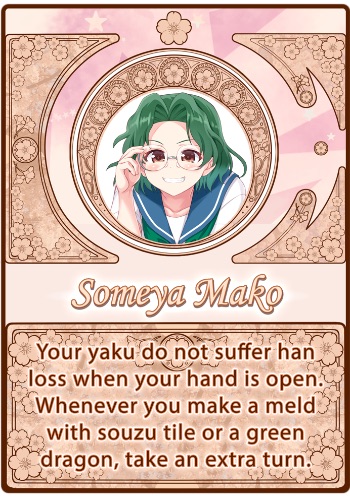
- Your yaku do not suffer a han loss on an open hand.
- Ability affects the following yaku: sanshoku dojun, ittsu, honitsu, chanta, junchan, chinitsu. It doesn’t let you score closed-only yaku, like pinfu, on an open hand.
- Whenever you make a meld with souzu tile or a green dragon, take an extra turn.
- Your yaku do not suffer a han loss on an open hand.
Takakamo Shizuno
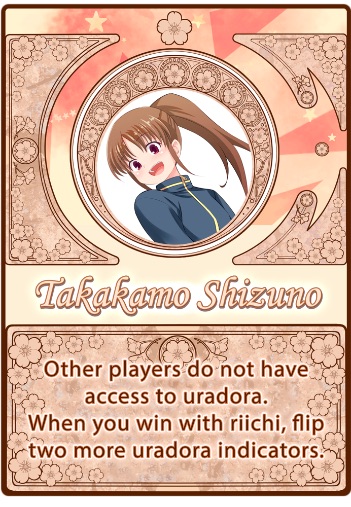
- Other players do not have access to uradora.
- When you win with riichi, flip two more uradora indicator.
- If you were to reveal the 6th or the 7th uradora indicator, use the live wall for that.
Takei Hisa
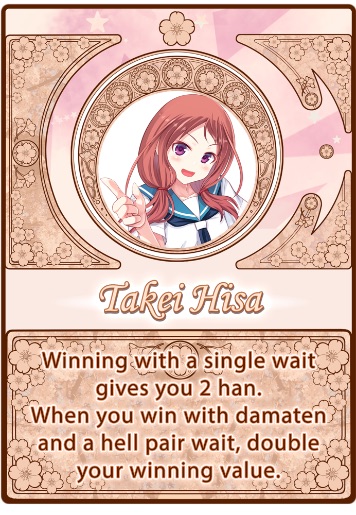
- Winning with a single wait gives you 2 han.
- 2 sided and better waits with every but one wait dead don’t give you that bonus.
- When you win with damaten and a hell pair wait, double your winning value.
- “hell wait” is a wait where 3 out of 4 tiles are already visible somewhere.
- Winning with a single wait gives you 2 han.
Takimi Haru
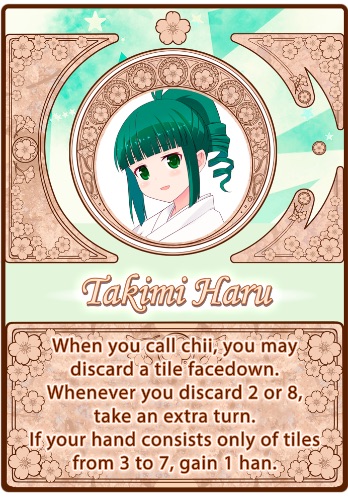
- When you call chii, you may discard a tile facedown.
- When you discard 2 or 8, take an extra turn.
- If your hand consists only of tiles from 3 to 7, you gain 1 han.
Toyouko Momoko
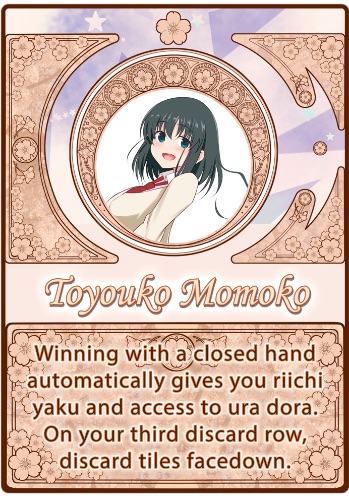
- Closed hand win automatically gives you riichi yaku and access to uradora.
- On your third discard row, discard tiles facedown.
Tsujigaito Satoha
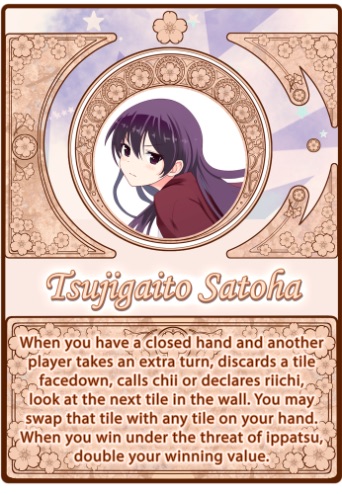
- When you have a closed hand and another player takes an extra turn, discards a tile face down, calls chii or declares riichi; Look at the next tile in the wall. You may swap that tile with any tile in your hand.
- When you win under the threat of ippatsu, double your winning value.
- “under the threat of ippatsu” means the round in which you can deal in to hand with ippatsu.
Usuzumi Hatsumi
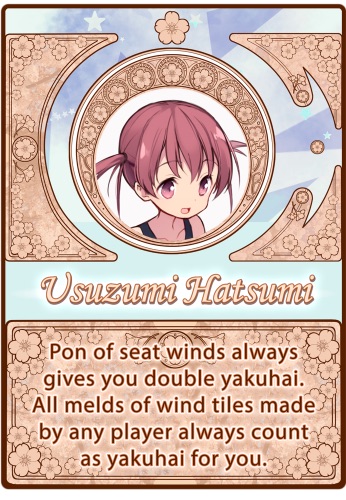
- Triplet of seat winds always gives you double yakuhai.
- All melds of wind tiles made by any player always count as yakuhai for you.
- Sequence-melds of wind tiles made by Kaori also count as yakuhai for Hatsumi.
Yumeno Maho
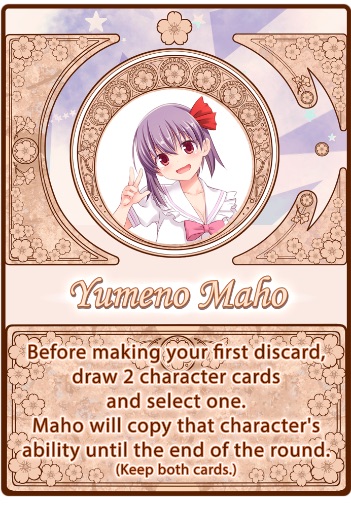
- Before making your first discard, draw 2 character cards and select one. Maho will copy that character’s ability until the end of the round.
- Keep both cards.
- After the end of a round you don’t shuffle both card back into the deck..
- Before making your first discard, draw 2 character cards and select one. Maho will copy that character’s ability until the end of the round.
General card clarifications
- Abilities that modify values of yaku are substitutive, not additive. “Pinfu gives you 2 han” means that for you the value of pinfu yaku is now 2 han instead of the usual 1 han.
- Many characters give you an additional han for something. These are bonuses, like the ones you get from dora. To win, you still need to have at least one yaku.
- Facedown tiles in discards are not counted for furiten, swapped tiles however can apply furiten.
- Facedown discards can be not be called, but can be ron’d if it is someone’s “always winning tile”. (e.g. Saki’s rinshan, Koromo’s houtei)
- A call from another player interrupts all abilities. For example, a player wouldn’t get an extra turn if their turn is interrupted by a call. A tile will not be swapped, if it gets called.
- All characters are always limited to 1 extra turn per normal turn, even if they fulfilled the condition for more extra turns.
- Extra turns are always optional. Player may decide to skip the extra turn and simply declare that their turn is over.
- Extra turns do not break ippatsu. That means that it is possible for some characters to effectively have 2 ippatsu draws.
- When ability opens additional dora indicators, riichi win will also have more uradora indicators. If there are no tiles left in the dead wall and you’re instructed to open additional dora indicator, move 2 tiles from the live wall into the dead wall, if possible.
- When players are instructed to bet more points than they have, they should bet as much as possible.
- Some cards can cause a hand from a player in riichi to become illegal by turning off their ability. You have to be extra careful. If in a result of that you have noten riichi hand you pay a reverse mangan penalty.
- When multiple players are tied for the last place the one farthest from the current dealer is considered to be in last place.
- If multiple players have the same priority level on a specific discard (e.g. Yukiko & Yuu), the player closest to the discarder takes the highest priority (atama hane).
- A tile can only be swapped if it was not called or ron’d by any player. When a tile is being swapped with a tile in the river, it cannot be called or declared ron by any player. The tile after swapping can apply or remove furiten respectively.
Agenda
| Godzina | Etap |
|---|---|
| 09:00 - 09:30 | Registration |
| 09:30 - 09:45 | Opening ceremony |
| 09:45 - 11:15 | 1st hanchan |
| 11:45 - 13:15 | 2nd hanchan |
| 13:15 - 15:00 | Lunch break |
| 15:00 - 16:30 | 3rd hanchan |
| 17:00 - 18:30 | 4th hanchan |
| 18:45 - 19:00 | Closing ceremony |